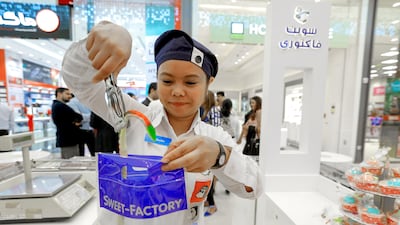Consumer spending in the UAE grew 14 per cent in the first quarter of 2022 boosted by government initiatives launched to streamline the nation's economic recovery after the Covid-19 pandemic, a new study from Majid Al Futtaim showed.
Most segments of the retail economy expanded in the first three months of the year, led by the food and beverage segment, according to the State of the UAE Retail Economy report that compared the sector's performance to the same period in 2019, before the pandemic.
Online shopping, which rose in popularity during the health crisis and has maintained its growth momentum, accounted for 11 per cent of all retail spending in the quarter, up from 5 per cent in the first three months of 2019.
Spending at hypermarkets and supermarkets rose 10 per cent during the period, accounting for 24 per cent of retail spending growth. The increase in spend was fuelled by online shopping, which now accounts for 12 per cent of this market, compared with 3 per cent in the first quarter of 2019, the report said.
“The launch of several federal-level, business-focused and growth-friendly initiatives, in addition to the government’s ongoing focus on pandemic management, has seen an undeniable, data-backed rebound in consumer confidence,” Alain Bejjani, chief executive of Majid Al Futtaim Holding, wrote in the report.
“The impact of this positive mood can be seen in the strength of the retail economy, with UAE residents and tourists increasing their spend in restaurants, supermarkets and shopping malls through Q1 2022.”
The UAE's economy grew 3.8 per cent last year, beating the World Bank's forecast of 2.1 per cent, Sheikh Mohammed bin Rashid, Vice President and Ruler of Dubai, said earlier this month.
That was led by the non-oil economy, which contributed 72.3 per cent to the country's economic output last year, as Covid-related restrictions and travel curbs eased.
The country's gross domestic product is expected to grow 5.7 per cent in 2022, according to Emirates NBD. Japan's largest lender MUFG predicts the UAE's economy will grow 4.9 per cent this year, while Abu Dhabi Commercial Bank estimates a 5.4 per cent expansion.
The seasonally-adjusted S&P Global United Arab Emirates Purchasing Managers’ Index also posted 54.8 for the second month running in March, as the rate of new business growth remained close to the post-pandemic high reported in November 2021.
The UAE retail sector's strong performance in the first three months of the year marks the third consecutive quarter in which it has posted growth after being in the negative territory since the first quarter of 2020, when compared with the respective period in 2019, the Majid Al Futtaim report showed.

The retail market has been strongly aided by the booming e-commerce segment, which is projected to grow 60 per cent to more than $8 billion by 2025 from 2021, according to a March survey by EZDubai, an e-commerce zone in Dubai South, and Euromonitor International.
About 75 per cent of those surveyed said they shopped online in 2021.
The increased shift towards cashless transactions has also prompted growth in the online shopping space. More than half of UAE consumers say they plan to use only cashless transaction methods by 2024, compared with the global average of 41 per cent, a recent study by Visa found.
The first quarter, traditionally a slow period for retailer as spending tapers after the holiday season, recorded 15 per cent growth in first-quarter fashion sales compared with the same period in 2019, boosted by non-luxury categories and accessories, as well as watches and jewellery, Majid Al Futtaim, which owns and operates 29 shopping malls, said.
Leisure and entertainment was the only retail sector still lagging behind pre-pandemic levels, with spending down by 10 per cent, it added.
Expo 2020 Dubai, which concluded last month, also played a significant role in the retail industry's growth, thanks to the influx of tourists who boosted spending. The mega event welcomed around 24 million visits during its six-month run.
“There can be no doubt that the final months of Expo 2020 played a key role here … it not only captured the UAE’s optimism but highlighted its importance as a global cultural and business hub,” Mr Bejjani said.

Tourist spending rose 7 per cent in the first quarter compared with the same period in 2019, with visitors from Saudi Arabia and the US accounting for nearly a third of total spending. Food and beverages, up 21 per cent, and hypermarkets and supermarkets, which rose by 15 per cent, led the improvement in spending.
Growing demand for entertainment and business events, part of the broader reopening of the economy, has supported overall growth in the retail sector, the report said.
Looking ahead, economic fundamentals are strong and the outlook for growth in 2022 remains positive, despite headwinds around price pressures, rising interest rates and continued supply chain disruptions expected through 2022 and 2023, Mr Bejjani said.
“Both the retail and the UAE economy are expected to build on a strong start to 2022 … propelled by increased spending and a growing influx of visitors and investors from overseas,” he said.
Majid Al Futtaim, one of Dubai’s biggest private sector conglomerates and the Middle East's largest malls operator, in February reported that it swung to a Dh2.46bn ($670 million) profit in 2021 amid continued economic recovery in the region.


